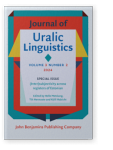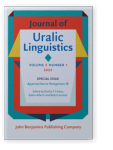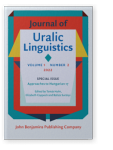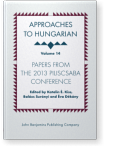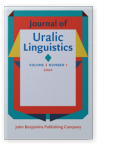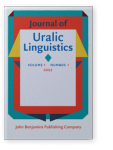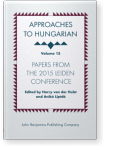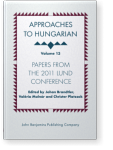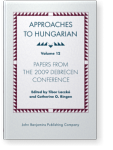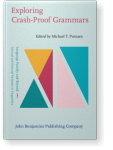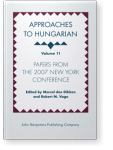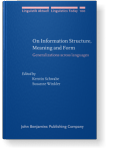Balázs Surányi
List of John Benjamins publications for which Balázs Surányi plays a role.
Journal
Titles
Approaches to Hungarian 18: Special issue of the Journal of Uralic Linguistics 2:1 (2023)
Edited by Donka F. Farkas, Gábor Alberti and Balázs Surányi
Special issue of Journal of Uralic Linguistics 2:1 (2023) v, 153 pp.
Subjects Theoretical linguistics | Uralic languages
Approaches to Hungarian 17: Special issue of the Journal on Uralic Linguistics 1:2 (2022)
Edited by Tamás Halm, Elizabeth Coppock and Balázs Surányi
Special issue of Journal of Uralic Linguistics 1:2 (2022) v, 130 pp.
Subjects Theoretical linguistics | Uralic languages
Approaches to Hungarian: Volume 14: Papers from the 2013 Piliscsaba Conference
Edited by Katalin É. Kiss, Balázs Surányi and Éva Dékány
[Approaches to Hungarian, 14] 2015. v, 296 pp.
Subjects Generative linguistics | Syntax | Theoretical linguistics | Uralic languages
2024 Preface Journal of Uralic Linguistics 3:1, pp. 1–3 | Introduction
2022 Editorial foreword Journal of Uralic Linguistics 1:1, pp. 1–3 | Editorial
This article introduces the Journal of Uralic Linguistics, outlining its motivations, aims and scope. It also provides a brief overview of the contents of the inaugural issue, which contains four research papers by leading scholars in the field.
read more2020 Word order effects of givenness in Hungarian: Syntax or prosody? Approaches to Hungarian: Volume 16: Papers from the 2017 Budapest Conference, Hegedűs, Veronika and Irene Vogel (eds.), pp. 137–164 | Chapter
This pioneering study presents results from a forced choice experiment designed to investigate the favoured linear placement of given constituents within the post-verbal domain of Hungarian. Specifically, the experiment tested the preferred relative position of textually given topical adjunct… read more
2017 Chapter 8. Focus and quantifier scope: An experimental study of Hungarian Approaches to Hungarian: Volume 15: Papers from the 2015 Leiden Conference, Hulst, Harry van der and Anikó Lipták (eds.), pp. 209–238 | Chapter
The scope interpretation of doubly quantified sentences is known to be influenced by a variety of contextual factors, among them, Information Structure. While the topic status of an NP has been recurrently argued to give rise to wide scope, the effect of focus status remains controversial: in the… read more
2013 Pseudoclefts in Hungarian Approaches to Hungarian: Volume 13: Papers from the 2011 Lund conference, Brandtler, Johan, Valéria Molnár and Christer Platzack (eds.), pp. 67–96 | Article
Based on novel data from Hungarian, this paper makes the case that in at least some languages specificational pseudocleft sentences must receive a ‘what-you-see-is-what-you-get’ syntactic analysis. More specifically, it is argued that the clefted constituent is the subject of predication… read more
2011 An interface account of identificational focus movement Approaches to Hungarian: Volume 12: Papers from the 2009 Debrecen Conference, Laczkó, Tibor and Catherine O. Ringen (eds.), pp. 163–208 | Article
This paper offers a purely interface-based account of the syntax of identificational focus in Hungarian, which eliminates all syntax-internal artifacts from the grammar of ‘focus movement.’ The analysis is based on two inescapable interface properties of id-focus: its prosodic prominence, and its… read more
2010 Toward a strongly derivational syntax Exploring Crash-Proof Grammars, Putnam, Michael T. (ed.), pp. 167–212 | Article
Pointing out several undesirable consequences that Merge gives rise to in the mainstream minimalist approach to phrase structure, a strongly derivational model is developed that dispenses with the narrow syntactic Merge operation. Representations and recursion are argued to be properties of the… read more
2009 Adpositional preverbs, chain reduction and phases Approaches to Hungarian: Volume 11: Papers from the 2007 New York Conference, Dikken, Marcel den and Robert M. Vago (eds.), pp. 217–250 | Article
This paper develops a syntactic account of two types of adpositional preverb constructions in Hungarian that explains their special behavior, including their mixed argument/adjunct properties. It is maintained that in neutral clauses both types of preverbs come to occupy a position left-adjacent to… read more
2007 Focus structure and the interpretation of multiple questions On Information Structure, Meaning and Form: Generalizations across languages, Schwabe, Kerstin and Susanne Winkler (eds.), pp. 229–253 | Article
